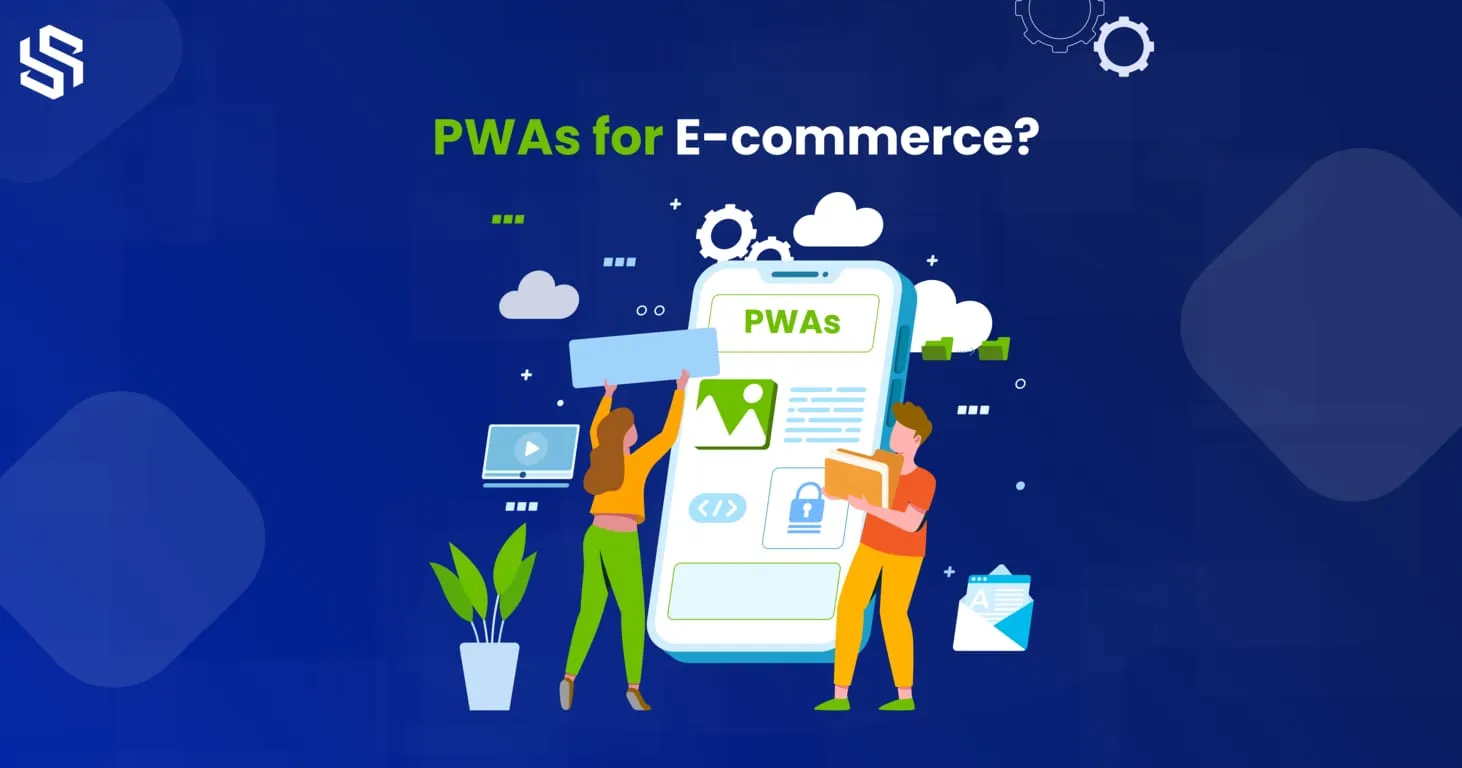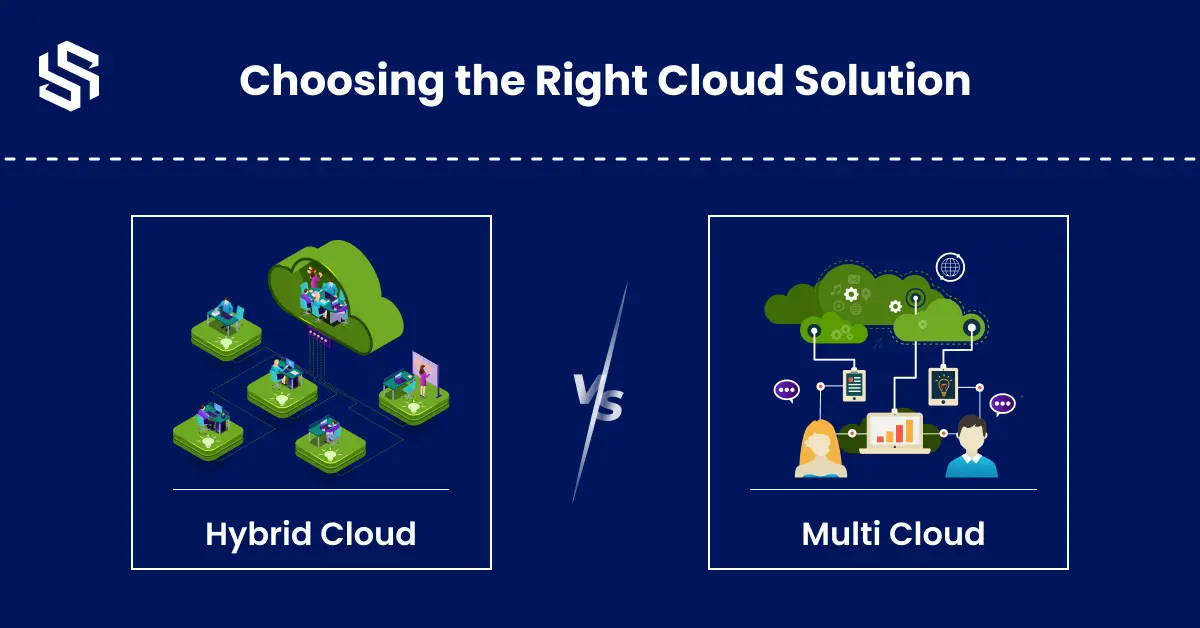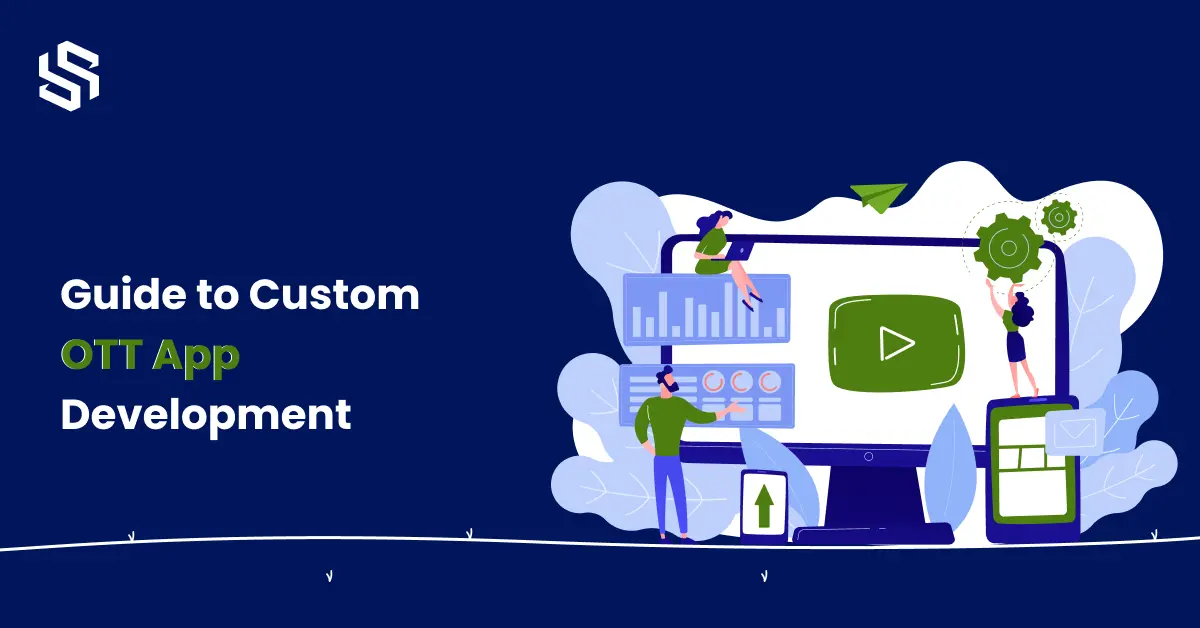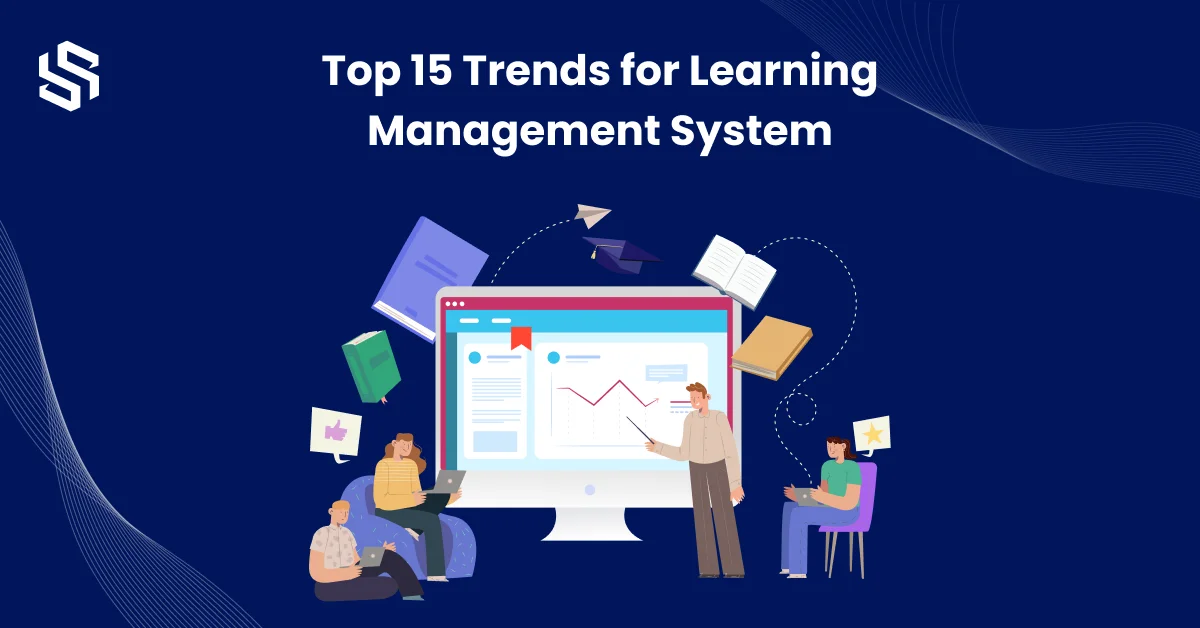In recent years, mobile users have drastically increased, with people spending hours and hours on phones. This ultimately makes it important for business owners to consider optimizing their websites for mobile devices too for a seamless user experience. This is where Progressive Web Apps (PWAs) come in.
Progressive web applications have been around since 2015 and have been preferred and used by Large companies such as Twitter, Walmart, AliExpress, and Alibaba for increasing conversion rates and growing revenues. Similarly, many small as well as medium-sized enterprises can take the benefits of PWA technology to create an app-like experience for their customers.
One of the biggest obstacles to investing in PWAs is a lack of understanding about what they are and the benefits they can offer businesses. By improving your knowledge and awareness of PWAs, you can unlock a powerful tool for enhancing your online presence and driving growth.
This blog with give you insights on what PWAs actually are, its benefits for e-commerce, and how to get started with this technology.
What is PWA in e-commerce? How do PWAs work?
Progressive Web Apps (PWAs) are revolutionizing how businesses approach web development. These web applications utilize cutting-edge technologies such as HTML, CSS, and JavaScript to deliver a native app experience on any device, whether a desktop, smartphone, or tablet.
With features such as offline access, push notifications, and home screen integration, PWAs are changing the game for businesses. In fact, a recent Jaxenter survey found that 46% of developers believe PWAs are the future, with only 14% backing native apps. It’s easy to see why – PWAs enhance user experience, boost conversion rates, and improve performance.
For developers, static site generators like Gatsby and VuePress make it easy to create highly engaging PWA storefronts. These storefronts can then be paired with e-commerce platforms on the backend, helping businesses to streamline their online presence.
PWAs are versatile, too. Some businesses may choose to replace their mobile apps entirely, while others may opt for a hybrid approach that combines both technologies. Ultimately, PWAs are websites that operate and look like native apps, making them a powerful tool for businesses looking to stay ahead of the curve.
Benefits of PWAs for E-commerce
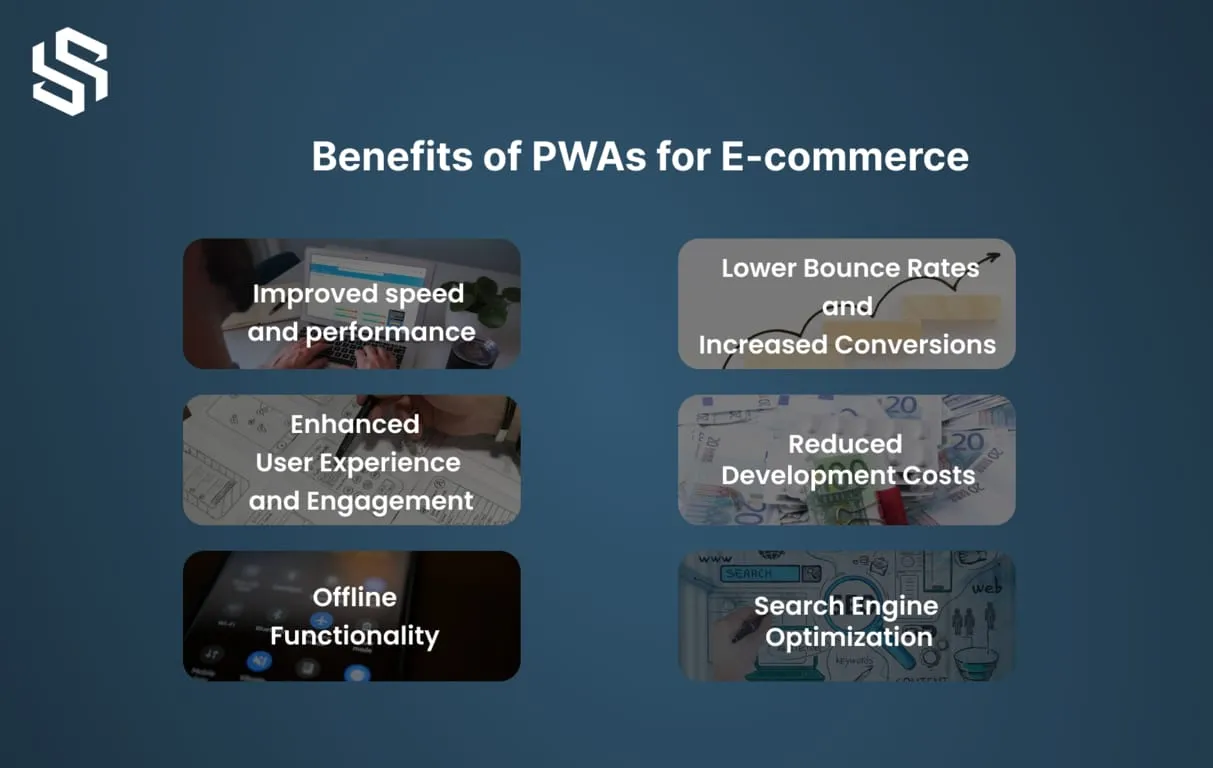
The mobile ecommerce market is expanding at an exponential rate, and it’s projected that by 2025, mobile web commerce will account for 44.2% of all retail ecommerce sales. Given this explosive growth, it’s not surprising that businesses are looking for innovative ways to tap into this burgeoning market.
Traditionally, native apps were seen as the go-to solution for businesses looking to establish a mobile presence. However, with the advent of PWAs, companies are increasingly turning to this new technology as a way to achieve the same level of functionality and user experience without the need for a native app.
As a result, PWAs are emerging as a viable option for businesses seeking to capitalize on the mobile e-commerce boom.
Improved speed and performance
Enhanced user experience and engagement
In today’s competitive e-commerce landscape, providing a good user experience is crucial for success. This is where PWAs come in, offering a fast, responsive, and seamless experience that mimics native apps. By adopting PWAs, you can provide an immersive, engaging, and user-friendly experience that increases user engagement, reduces bounce rates, and boosts customer satisfaction.
With PWAs, users can install your app on their home screen, making it easily accessible and convenient. Moreover, PWAs are designed to work seamlessly even with unstable network connections, providing uninterrupted access to your website. This ensures that users can browse and shop on your website without any hiccups, leading to higher conversion rates.
The benefits of PWAs don’t stop there. They also offer advanced features such as push notifications, offline mode, and device hardware integration, making them a powerful tool to engage users and increase their loyalty.
Offline functionality
Lower bounce rates and increased conversions
PWAs offer clients an improved user experience, and an improved user experience means a seamless and easy-to-use experience, which can drastically lower bounce rates and increase conversions.
This experience may be delivered by PWAs by offering speedy page loading, smooth animations, and straightforward interactions. Additionally, consumers may be reminded about abandoned carts and encouraged to complete their purchases through push alerts.
For instance, Alibaba saw a 76% boost in conversions after using PWAs across several browsers.
Reduced development costs
Search Engine Optimization
Search engine optimization (SEO) is the process of optimizing your website to rank higher in search engine results pages (SERPs). PWAs are built using modern web technologies and follow best practices for SEO. PWAs can help improve search engine rankings and drive more organic traffic to your site.
One of the advantages of PWAs for SEO is that they use a single URL for all devices. This means that search engines only have to index one version of your website, which can improve your website’s SEO ranking. Additionally, PWAs are fast and responsive, which can improve your website’s SEO ranking as search engines favor fast-loading websites.
Want to get SEO experts look into getting your business rank better in SERP?
Our team of SEO professionals can help you out. Contact Now!
How to Implement PWAs in E-commerce?
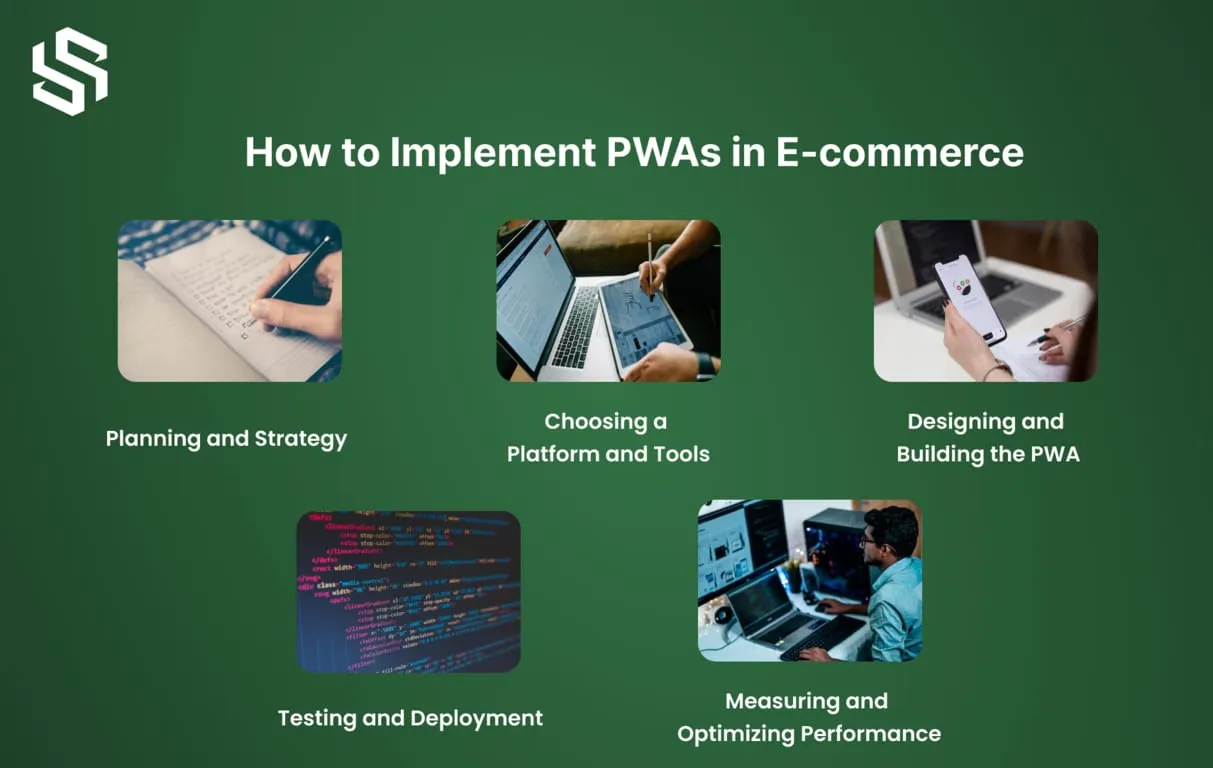
Planning and strategy
Choosing a platform and tools
Designing and Building the PWA
Testing and deployment
Measuring and optimizing performance
Want to boost your online sales and grow your e-commerce business?
Let’s talk!
Some of the Ready-to-Use eCommerce PWA solutions
Now that you are aware of the benefits of using a PWA storefront for your e-commerce store, you might be wondering how to build one.
Here are some pwa ecommerce examples to consider:
1. Deity

Deity is a popular PWA platform known for its micro-services-oriented architecture. With DEITY Falcon, a PWA front-end, businesses of all sizes can offer scalable, robust web and mobile experiences to their users.
Deity recently partnered with BigCommerce to provide a headless configuration for creating web experiences with a faster speed of innovation and lower cost of ownership.
2. Gatsby

Gatsby is a widely used framework for building static PWA sites with React. With excellent documentation and a strong PWA development community, Gatsby enables the building of blazing-fast websites and apps.
Third and Grove developed a Gatsby-BigCommerce source plugin that simplifies building a PWA e-commerce storefront using Gatsby on the front-end and BigCommerce on the back-end. BigCommerce also released a Gatsby-Netlify CMS template to jump-start developing a serverless pwa ecommerce template.
3. Vue Storefront

Vue Storefront is a rapidly growing platform-agnostic PWA, making it compatible with most e-commerce platforms, including BigCommerce.
Vue Storefront has gained popularity among developers, as evident from its increasing stars on GitHub and the over 1,200 members on the Vue Storefront Slack channel.
Conclusion:
In conclusion, it’s hard to predict what the future holds, but one thing is certain: PWAs have the potential to revolutionize the digital landscape. Despite their slow start, PWAs offer unique benefits that traditional native applications simply cannot match.
From offline capabilities to blazing-fast speed, PWAs have the potential to transform and streamline websites and online stores. As companies continue to seek ways to stay ahead of the curve, it’s likely that PWAs will increasingly become a focal point for developers and businesses alike. To put it briefly, any company that offers Shopify development services or products online will profit in the near future from progressive technology.
For professional assistance in choosing the best mobile and web development solutions for your business, look no further than Syndell. Our team of Shopify development experts can help you identify the right tools and strategies to achieve your business goals and improve your online presence.
Contact us today to learn more about how we can help your business thrive in the digital world or hire our Dedicated Shopify developers to get started with your development journey.
FAQs
PWA stands for Progressive Web App. It’s a type of web application that delivers an app-like experience to users using modern web capabilities. PWAs can be installed on a user’s device and function similarly to native mobile applications.
PWAs offer an app-like experience to users and can be installed on a user’s device. Web apps, on the other hand, are traditional web applications that run in a browser.
Some potential disadvantages of PWAs include limited access to native device functionality, reduced discoverability, and limited support for older browsers. However, PWAs offer several advantages over native apps such as lower development costs, easier maintenance, and improved accessibility.
PWAs are web applications, whereas traditional mobile apps must be downloaded and installed on the user’s device. PWAs offer a similar user experience to native apps, but with the added benefit of being available on any device and not requiring installation.
PWAs use service workers to cache data, allowing the app to work offline and load instantly. This results in faster page loads and a smoother user experience.
Yes, PWAs are designed to be accessible on any device, regardless of the platform. As a result, they are a cost-effective solution for businesses seeking to reach a larger audience.
PWAs can work offline, thanks to their use of service workers to cache data. Users can access content even if they are not connected to the internet.
PWAs provide a seamless user experience that can reduce bounce rates and increase conversions. They can also send push notifications to users, improving engagement and retention. Furthermore, they are a low-cost option for businesses looking to optimize their websites for mobile devices.
Yes, PWAs can be integrated with other ecommerce platforms to provide a cohesive user experience across all channels. This includes channels such as social media, email marketing, and others.
PWAs can improve search engine rankings by providing a fast and responsive website that is optimized for mobile devices. This can result in higher visibility and more traffic to the website.
Yes, PWAs can be updated and maintained easily, as they only require a single update that can be deployed across multiple platforms. This makes maintenance and updates much easier and cost-effective for businesses.


